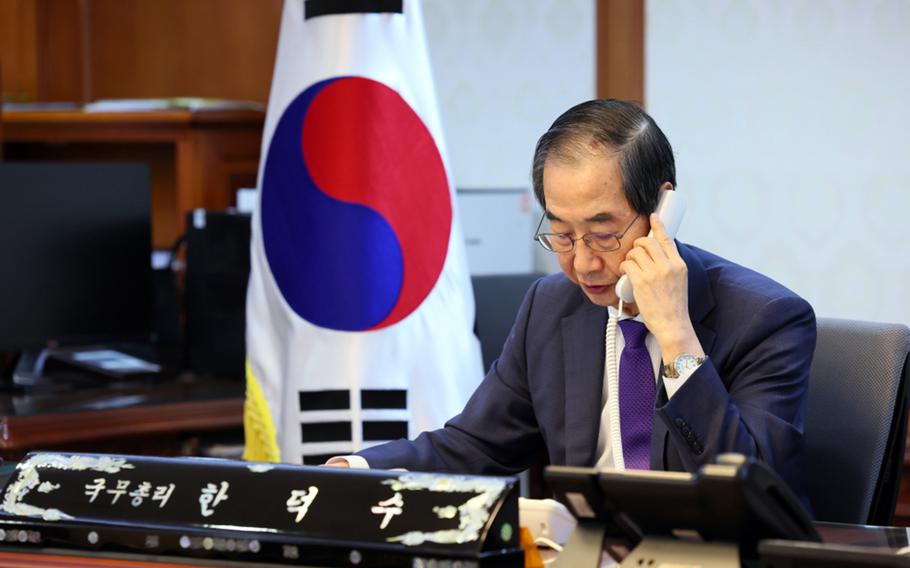
South Korea’s acting president, Han Duck-soo, speaks to President Joe Biden by phone from his office in Seoul, South Korea, Dec. 15, 2024. (South Korean Office of Government Policy)
CAMP HUMPHREYS, South Korea — South Korea’s acting president made an introductory phone call to the commander of U.S. and U.N. forces on the peninsula to reaffirm the countries’ military alliance and express concern for potential moves by North Korea.
Han Duck-soo, the country’s prime minister, assumed the presidential office Saturday following Yoon Suk Yeol’s impeachment by the National Assembly.
Speaking by phone Sunday to U.S. Forces Korea commander Army Gen. Paul LaCamera, Han voiced concern that Pyongyang may capitalize on the South’s political turmoil to conduct ballistic missile launches and cyber-attacks, according to a news release from the Office of Government Policy.
Han shared his concerns of potential “military provocations” by North Korea given the “current emergency situation” surrounding Seoul, the release states.
He also conveyed to LaCamera that the two nations should strengthen their joint military capabilities and that their alliance was “more important than ever,” according to the release.
LaCamera commands roughly 28,500 American troops in South Korea, most of them stationed at Camp Humphreys, about 40 miles south of Seoul. He is also the head of the U.N. Command and the Combined Forces Command.
LaCamera told Han he will “work to mitigate any risks to planned combined training activities, operations, and investments, while reaffirming the ironclad commitment to the combined defense,” USFK said in a separate statement Sunday.
So far this year, North Korea has fired more than 45 ballistic missiles in 12 separate days of testing. The communist regime’s last launch consisted of seven ballistic missiles fired on Nov. 5.
Throughout the year, Pyongyang has also jammed GPS signals around the border separating the two countries, according to the South’s military.
Park Jae Jeok, an associate professor at the Yonsei University, Seoul, said he does not believe South Korea and the United States will dramatically escalate tensions if the North fires another ballistic missile.
“I think if North Korea engages in provocations, South Korea and the United States are going to respond to it as usual,” Park said by phone Friday. “I don’t think we can escalate tensions by responding very actively.”
Washington and Seoul have responded to the North’s missile launches with statements of condemnation and military drills.
The day after Pyongyang test-fired an intercontinental ballistic missile on Oct. 31, fighter jets from the U.S., South Korea and Japan escorted an Air Force B-1B Lancer bomber on a show of force between Japan and South Korea.
Park said he believes North Korea is unlikely to engage in provocations against the South in the near term “because it only helps the ruling party” by fueling animosity toward the regime.
Yoon’s ruling People Power Party advocates hawkish policies against Pyongyang. In June, party lawmakers approved of the military’s resumption of anti-communist loudspeaker broadcasts aimed at the northern side of the border in retaliation for the North floating thousands of balloons carrying trash to the South.
The party has been in turmoil since Yoon’s abrupt martial law declaration Dec. 3, including several high-profile defections, among them party leader Han Dong-hoon, who resigned Monday.
“I think North Korea would like to see the opposition party control South Korea and win the election,” Park said, referring to the liberal Democratic Party. “I don’t think North Korea will have an interest in engaging in military provocations for a while.”